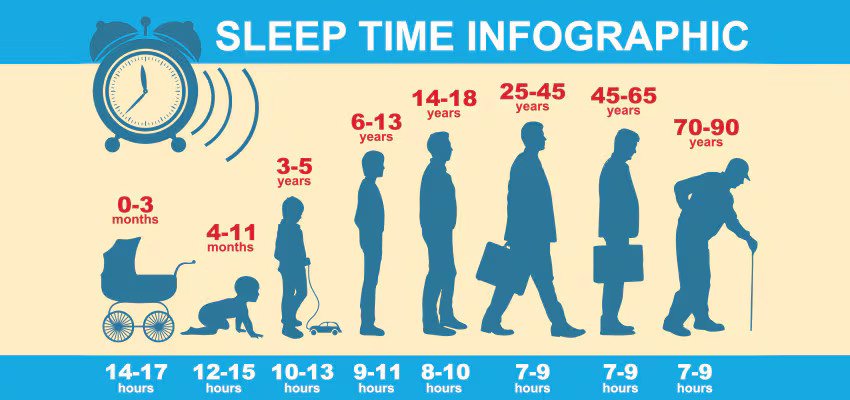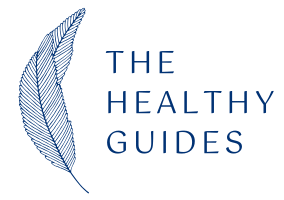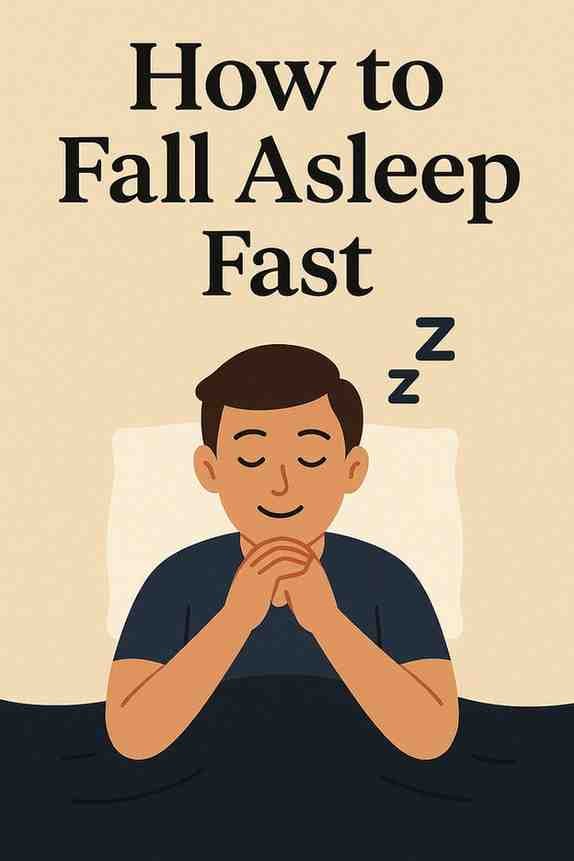1. Introduction: Why Sleep Duration is the Health Habit We Often Ignore
Healthy sleep duration isn’t just a wellness buzzword — it’s a crucial part of keeping your mind and body in peak condition. Yet in the rush of work deadlines, family obligations, and late-night screen scrolling, sleep is often the first thing we sacrifice. It’s easy to think shaving off an hour or two won’t matter after all, you can “catch up” on the weekend, right?
Not so fast. Your sleep duration how many hours you actually spend asleep each night — plays a huge role in your physical health, mental well-being, and even how long you live. And it’s not just about clocking a number of hours. Quality matters just as much as quantity.
In this guide, we’ll explore the science of sleep duration, answer questions like Is 6 hours of sleep enough?, look at the effects of sleeping too much, and dive into sleep deprivation symptoms, how much deep sleep you need, and oversleeping side effects. By the end, you’ll have a clear picture of how to find your personal “sweet spot” for restorative rest.
2. What Exactly Is Sleep Duration?
Sleep duration is the total amount of time you spend actually sleeping in a 24-hour period. This is different from time in bed, because even if you’re lying there for 8 hours, interruptions like waking up to check your phone or tossing and turning mean your actual sleep time is less.
Sleep experts often track sleep efficiency — the percentage of time in bed that you’re actually asleep. For example, if you’re in bed for 8 hours but only sleep 6, your sleep efficiency is 75%. Ideally, you want to be in the 85–95% range.

3. Recommended Sleep Duration by Age Group
The National Sleep Foundation and the Centers for Disease Control and Prevention (CDC) have issued guidelines for how much sleep different age groups need.
| Age Group | Recommended Sleep Duration |
|---|---|
| Adults (18–64) | 7–9 hours |
| Older adults (65+) | 7–8 hours |
| Teenagers (14–17) | 8–10 hours |
| Children (6–13) | 9–11 hours |
| Preschoolers (3–5) | 10–13 hours |
| Infants (4–11 months) | 12–15 hours |
This brings us to the popular question: Is 6 hours of sleep enough?
For most healthy adults, the answer is no. Research consistently shows that fewer than 7 hours of sleep over an extended period can lead to health issues, even if you feel fine. There are rare individuals with a genetic mutation who can function well on 6 hours, but for the majority, it’s simply not sufficient for optimal physical and mental performance.
4. The Science Behind Healthy Sleep Duration & Health
4.1 Physical Health
Adequate sleep supports nearly every system in your body:
- Immune function: Sleep is when your body produces infection-fighting cells and antibodies. Chronic short sleep makes you more susceptible to colds, flu, and other illnesses.
- Heart health: Sleep helps regulate blood pressure and reduces strain on your cardiovascular system.
- Metabolism & weight: Poor sleep disrupts hormones like leptin and ghrelin, which regulate hunger. That’s why sleep-deprived people often crave high-carb, high-fat foods.
4.2 Mental Health
Good sleep stabilizes mood, reduces irritability, and supports mental resilience. People who sleep well are better at regulating emotions, solving problems, and staying focused.
4.3 Longevity
Multiple long-term studies show that people who consistently sleep 7–8 hours a night have the lowest mortality risk. Too little — or too much — sleep over years is linked to shorter lifespan.
5. Too Little Sleep: Health Risks
Chronic short sleep is more than just feeling groggy. The sleep deprivation symptoms can be physical, mental, and behavioral:
- Daytime fatigue and drowsiness
- Memory lapses or difficulty concentrating
- Mood swings, irritability, or depression
- Reduced coordination and slower reaction times
- Increased cravings for unhealthy food
- Weakened immune system
Over time, insufficient sleep increases the risk of obesity, diabetes, heart disease, stroke, and certain cancers. It also raises accident risk — both on the road and at work.
6. Too Much Sleep: Is There Such a Thing?
Yes. While most advice focuses on getting more sleep, healthy sleep duration also means avoiding the effects of sleeping too much, which can be harmful. Oversleeping — typically defined as regularly sleeping more than 9–10 hours for adults — can be linked to:
- Higher rates of cardiovascular disease
- Increased inflammation in the body
- Lower physical activity levels
- Cognitive decline in older adults
And here’s the twist: oversleeping side effects often aren’t caused by the long sleep itself but by underlying health problems like depression, sleep apnea, or chronic illnesses. That’s why persistent oversleeping should be discussed with a healthcare provider.
7. Healthy Sleep Duration: Quality vs. Quantity and Why Both Matter
Getting 8 hours of restless, interrupted sleep isn’t the same as 8 hours of deep, restorative rest. Sleep is made up of cycles:
- Light sleep (Stages 1 & 2) — transition and preparation for deeper sleep
- Deep sleep (Stage 3) — physical restoration, immune strengthening, tissue repair
- REM sleep — brain restoration, memory processing, emotional regulation
So, how much deep sleep do you need?
On average, deep sleep should make up about 13–23% of your total sleep. For an 8-hour night, that’s roughly 1–2 hours. Getting less can leave you feeling physically drained even if you slept “enough” hours.
8. Lifestyle Factors That Impact Sleep Duration
Your daily habits can either support or sabotage healthy sleep:
- Diet & caffeine: Late-night coffee or heavy meals can delay sleep onset.
- Exercise timing: Moderate exercise promotes sleep, but intense workouts right before bed may make it harder to wind down.
- Stress & screen time: Blue light from devices disrupts melatonin production.
- Environment: Too much light, noise, or the wrong temperature can cut sleep short.
9. Healthy Sleep Habits for Optimal Duration
If you want to improve both the quantity and quality of your sleep, try these healthy sleep habits:
- Go to bed and wake up at the same time every day — even weekends.
- Create a wind-down routine (reading, stretching, meditation).
- Limit screen exposure an hour before bed.
- Keep your room cool, dark, and quiet.
- Avoid large meals, alcohol, and caffeine close to bedtime.
10. Tracking & Improving Your Sleep
Sleep diaries, wearable trackers, and apps can help you monitor and maintain a healthy sleep duration. Look for trends: are you consistently under 7 hours? Do you wake up often? Do you feel rested when you wake? Small adjustments — like moving dinner earlier or dimming lights — can make a big difference.
11. Cultural & Work Factors
Shift workers, healthcare professionals, and people in high-stress industries often face chronic sleep challenges. In some cultures, “burning the candle at both ends” is a badge of honor — but at the cost of long-term health. Public health campaigns increasingly highlight the need for sleep as a pillar of wellness alongside nutrition and exercise.
12. Special Considerations
- Pregnancy: Hormonal changes can disrupt sleep cycles.
- Chronic illness: Pain or medication side effects can shorten or lengthen sleep.
- Athletes: May need more sleep for recovery.
- Students: Often suffer from irregular schedules and late-night studying.
13. Conclusion – Find Your Sleep Sweet Spot
Your healthy sleep duration is the amount of rest that leaves you waking refreshed, alert, and healthy most often between 7–9 hours for adults. Whether you’ve been wondering Is 6 hours of sleep enough? or worried about the effects of sleeping too much, the key takeaway is balance. Avoid chronic sleep deprivation symptoms, aim for enough deep sleep, and be mindful of oversleeping side effects. Your ideal sleep duration is the amount that leaves you waking refreshed, alert, and healthy, most often between 7–9 hours for adults. Whether you’ve been wondering Is 6 hours of sleep enough? or worried about the effects of sleeping too much, the key takeaway is balance. Avoid chronic sleep deprivation symptoms, aim for enough deep sleep, and be mindful of oversleeping side effects.
Small changes — like setting a consistent bedtime or limiting late-night screen time — can add years to your life, boost daily performance, and protect both body and mind.
❓Frequently Asked Questions (FAQs)
1. Is 6 hours of sleep enough?
For most healthy adults, 6 hours of sleep is not enough on a regular basis. While a small percentage of people have a genetic trait that lets them function well on less sleep, the majority need 7–9 hours for optimal health, mental performance, and mood stability.
2. What are the effects of sleeping too much?
Oversleeping, or regularly sleeping more than 9–10 hours per night, can be linked to higher risks of heart disease, obesity, depression, and cognitive decline. Sometimes, sleeping too much is a symptom of an underlying health issue that should be checked by a doctor.
3. What are common sleep deprivation symptoms?
Signs you’re not getting enough sleep include constant fatigue, irritability, trouble focusing, memory lapses, reduced coordination, increased cravings for unhealthy food, and a weakened immune system.
4. How much deep sleep do you need?
Deep sleep should make up about 13–23% of your total nightly rest. For most adults sleeping 8 hours, that’s roughly 1–2 hours of deep, restorative sleep — crucial for tissue repair, immune function, and physical recovery.
5. What are oversleeping side effects?
Regularly oversleeping can lead to headaches, grogginess, mood swings, and increased inflammation. Long-term oversleeping may also raise the risk of chronic diseases and lower daily energy levels.
6. How can I improve my sleep duration and quality?
To get healthier sleep, go to bed and wake up at consistent times, create a relaxing bedtime routine, limit screens before bed, keep your bedroom cool and dark, and avoid caffeine late in the day.
Your brain needs fuel too—learn how the right diet can boost your mood and energy in our healthy eating guide.”
Looking for more ways to stay energised and motivated? Head over to our sports blog for inspiration and active lifestyle tips.”







